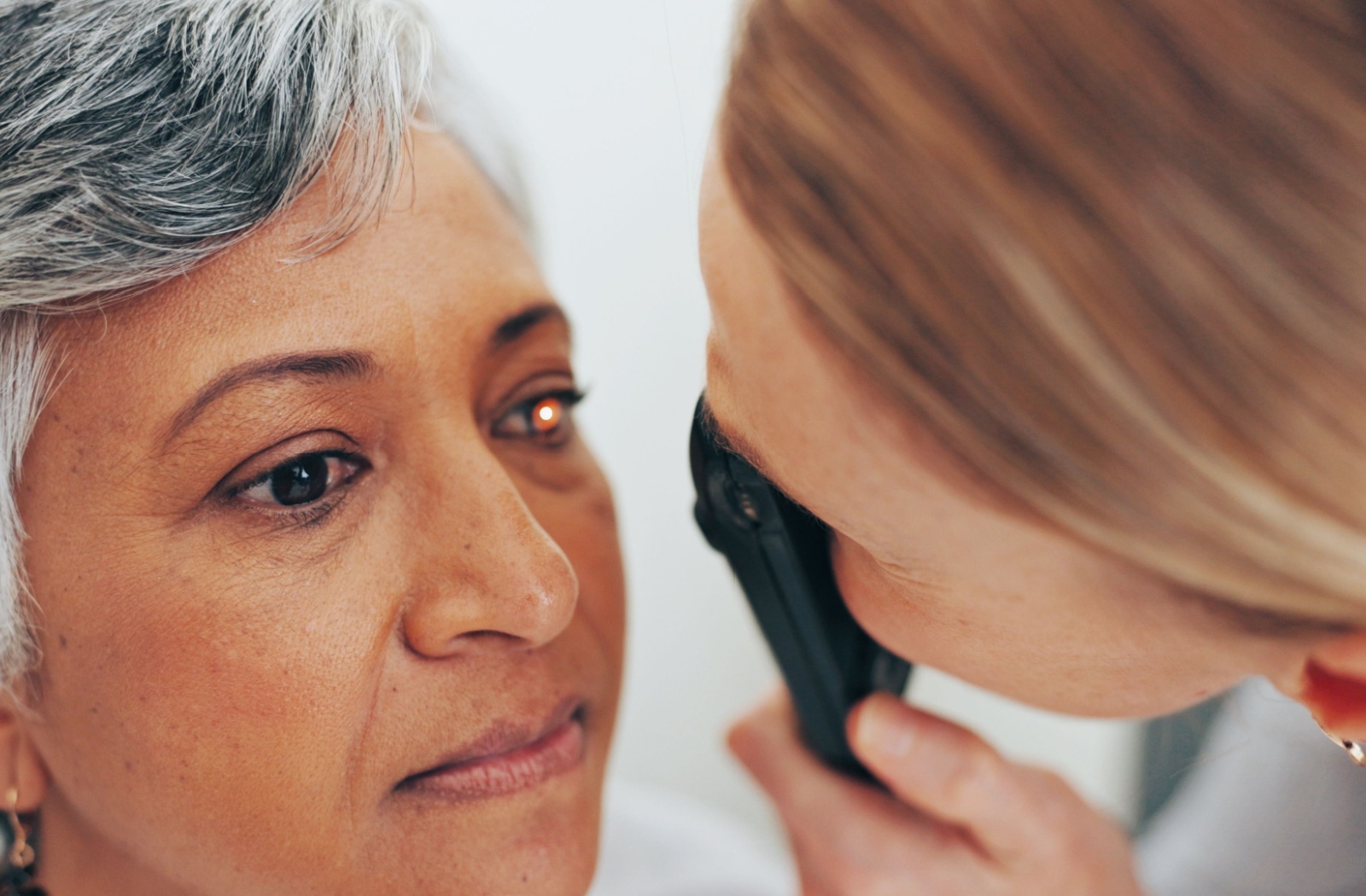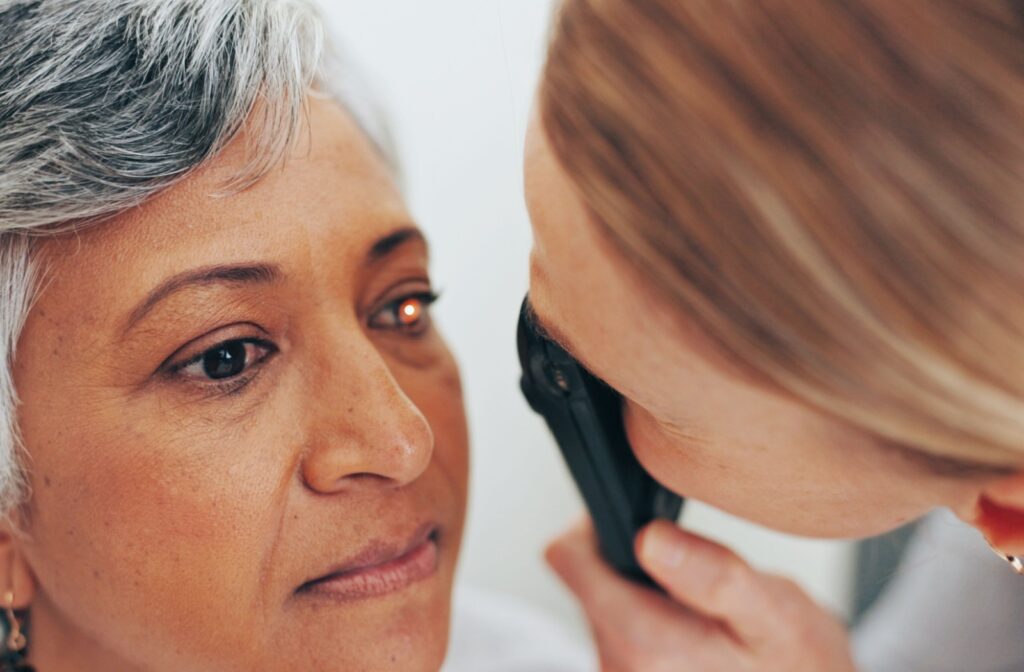Your eyes provide a window into your health. Routine eye exams can uncover more than just vision problems—they can detect various conditions (systemic and ocular) before symptoms appear elsewhere.
An eye exam can identify eye concerns and diseases such as glaucoma, retinal detachment, cataracts, or macular degeneration even in their early stages. Without timely intervention, these diseases can pose a serious threat to your vision.
Eye exams can also detect changes that might stem from general health conditions, such as diabetes, stroke, or even certain cancers. The sooner we identify any concerns, the better the outcome may be.
Annual eye exams benefit everyone, not just people who wear corrective lenses. Your eyes deserve the world, so thank them by staying on top of your eye health.
Detecting Eye Diseases with a Routine Eye Exam
Your eyes are highly complex organs, and even subtle changes in their structure can signal serious problems.
Keeping up with routine eye exams allows your optometrist to identify even minor changes early. Timely intervention helps preserve your vision and prevent long-term damage.
Glaucoma
Glaucoma is often called the “silent thief of sight” because it develops gradually and usually without early symptoms. This condition damages the optic nerve, and as it progresses, it can affect your peripheral vision.
During an eye exam, your doctor will use tools like tonometry (air-puff test) to measure the pressure inside your eyes and perform a visual field test to evaluate your peripheral vision.
Retinal images (fundus photography and OCT scans) capture detailed images of the back of your eye, including the optic nerve and blood vessels. Swelling or excess fluid buildup in the eye can signal glaucoma, a condition that, if left untreated, can lead to permanent vision loss.
Retinal Detachment
Retinal detachment is a medical emergency where the retina pulls away from the back of the eye.
Left untreated, it can cause blindness. Your optometrist may detect early warning signs like retinal tears or detachment through a dilated eye exam. This allows them to examine the back of your eye in detail and spot subtle signs before you notice symptoms like flashes or floaters.
Cataracts
Cataracts cause clouding of the eye’s natural lens, resulting in blurry or hazy vision.
Although cataracts are more common with age, they can also develop from trauma or other conditions. Eye exams can detect these early, allowing for timely intervention, such as monitoring them or planning cataract surgery.
Macular Degeneration
Where glaucoma affects peripheral vision, macular degeneration is an eye disease that affects central vision by damaging the macula.
Your optometrist can look for early signs like yellow deposits (drusen) or pigment changes using retinal scans, carefully observing the macula for any abnormal changes. Detecting macular degeneration early is crucial to slow its progression and preserve vision.
Uncovering Systemic Health Conditions
Beyond eye health, your optometrist can often identify underlying systemic health issues. Changes in your eyes may signal problems in other areas of your body, making eye exams a valuable tool in preventive care.
Diabetes
An eye exam can detect diabetes. Diabetic retinopathy can be one of the first warning signs of diabetes. High blood sugar levels can damage the blood vessels in the retina, causing swelling, leakage, or unusual growths. These changes are visible during a thorough retinal examination.
Although managing diabetes can help lower the risk of developing diabetes-related visual changes, it doesn’t eliminate the risk entirely. This is why people with type 1 and type 2 diabetes are strongly encouraged to have annual diabetic eye exams on top of their routine visits.
Stroke
Believe it or not, certain eye changes can signal a risk of stroke. Blockages in retinal blood vessels or areas of reduced blood flow detected during an eye exam may indicate cardiovascular issues.
Sudden changes in vision, such as loss of peripheral vision, can sometimes occur after a stroke or signal an elevated risk. Routine checks are a way to verify that these warning signs aren’t missed.
Cancer
Cancer might not be the first condition you associate with an eye exam, but optometrists can occasionally detect signs of cancer in its early stages.
Eye Cancer
Tumors can form in or around the eye. Changes in the eye’s appearance, pupil size, or unusual growths during an exam may indicate melanoma or other eye cancers.
Early detection dramatically increases the chances of successful treatment.
Brain Tumors
Certain vision changes, like optic nerve swelling (papilledema), can suggest increased pressure in the brain, a possible sign of a tumor.
Your optometrist will refer you for further testing and to see a specialist if they notice any of these changes.
Routine Eye Exams Are for Everyone
Many people mistakenly think that eye exams are only for people who wear glasses or have visual problems. In reality, everyone, from children to seniors, benefits from routine eye exams. Here’s why:
- Early detection: Many diseases (eye-related and systemic) can develop without obvious symptoms. Regular exams catch them early before serious problems arise.
- Prevention: By spotting risk factors or early signs of disease, you can take steps to protect your vision and overall health.
- Tailored care: During an exam, your optometrist learns about your specific needs and lifestyle, offering personalized advice to help keep your eyes healthy.
Eye exams have come a long way and go beyond a simple vision screening. At Luminance Vision, we take advantage of modern technology and diagnostic tools to evaluate the health of your eyes. Even in a year, your eyes can change more than you think. Make it your goal to book an annual exam—even if your vision feels perfect.
Support Healthy Eyes for a Healthy Life
The little steps you take today, such as scheduling your routine eye exam, can make all the difference in how you see tomorrow.
Don’t wait for a wake-up call to realize how valuable your eyesight is—start making it a priority now. At Luminance Vision, we’re here to help you stay on top of your eye health. Request a routine eye exam today with our experienced team. Your future self will thank you!




